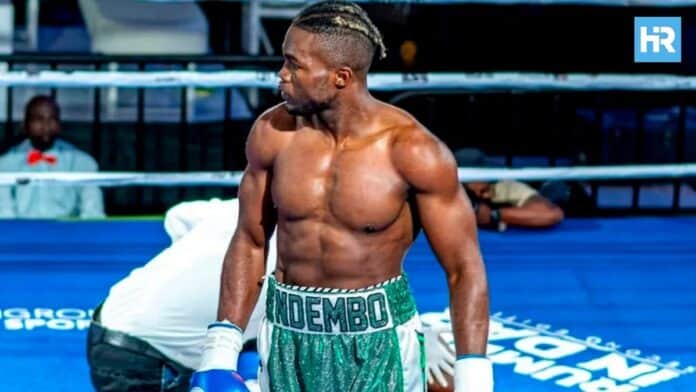This article delves into the tragic stories of boxers who died as a result of injuries sustained in the ring, highlighting the harsh realities and risks of the sport.
It explores how their deaths have influenced changes in boxing regulations and raised ongoing concerns about fighter safety.
[su_box title=”Key Takeaways” box_color=”#003F81″ radius=”9″]
- Ardi Ndembo died after spending three weeks in a medically induced coma due to injuries from a boxing match.
- The boxing world’s reaction, including tributes and support initiatives, shows the community’s commitment to supporting families affected by such tragedies.
- The deaths of several boxers over the decades have led to significant safety reforms in the sport, aiming to protect current and future athletes.
[/su_box]
The Fight That Took Ndembo’s Life
Recently, heavyweight boxer Ardi Ndembo, only 27 years old, tragically died after a knockout led to a three-week coma.
The Congolese boxer, who was undefeated with an 8-0 record before the bout, faced Nestor Santana in Miami on April 5, 2024.
During the fight, Ndembo suffered a critical injury that rendered him unconscious, with the need for immediate hospitalization. Subsequently, he was placed in a medically induced coma to manage his injuries but passed away shortly after.
Boxing Community Mourns Ndembo’s Passing
The boxing community has expressed profound grief and shock over Ndembo’s untimely death.
Viva Promotions, the organization representing Ndembo, released a heartfelt statement via the New York Post: “We at Viva Promotions mourn the loss of Ardi Ndembo, a talented Congolese boxer who tragically passed away after a knockout in a Team Combat League match on April 5. He remained in an induced coma until his untimely death. RIP Ardi Ndembo!”
Additionally, Jeff Mayweather, an uncle of renowned boxer Floyd Mayweather and a member of the Team Combat League, shared his thoughts on the perils of boxing.
In an interview with The Sun, he remarked, “Boxing’s a sport where you grow up watching it and loving it, but there’s so much risk involved. Anyone can lose their life from boxing. When something like this happens, it wakes up the whole entire world. I don’t think boxing’s a bad sport, because you can die in any sport. You drive a race car at 200 mph, if it slides, you’re going to die, too. You can die in any sport, but boxing is a brutal sport.”
Tributes and Support for Ndembo’s Family
In memory of Ndembo, the boxing league held a 10-bell salute and announced a matching donation of up to $25,000 to a GoFundMe campaign set up to support his bereaved family.
Ndembo leaves behind a wife and two children, and his death casts a long shadow over the sport, prompting reflections on its risks and the need for ongoing improvements in safety protocols.
Remembering Boxers Who Who Lost Their Lives in the Ring
Throughout the 20th and 21st centuries, the sport of boxing has witnessed the untimely and tragic deaths of many fighters, which have sparked significant changes in regulations to improve the safety of the sport.
Here is a detailed look at some of these fighters, the circumstances of their deaths, and the resulting safety improvements:
Frankie Campbell (August 25, 1930)
Frankie Campbell’s tragic death occurred during a match against Max Baer in San Francisco. In the brutal fight, Campbell suffered a fatal brain injury.
Despite being knocked down and telling his corner “something feels as though it broke in my head,” he continued to fight until he was eventually knocked out. After the fight, he never regained consciousness and died due to severe brain trauma.
This incident led to public outcry and changes in boxing regulations, including improved safety equipment and medical standards for fighters. The referee and both fighters’ management teams were suspended due to their roles in the tragedy.
Davey Moore (March 21, 1963)
Davey Moore died following a fight with Sugar Ramos during which he was knocked down and his neck struck the bottom rope, causing a severe brain injury.
He initially appeared coherent after the fight but later slipped into a coma and died three days after the match.
His death raised significant concerns about the safety of boxing rings, particularly the design of the ropes and corners, leading to changes in their construction to improve safety.
Kim Duk-koo (November 13, 1982)
Kim Duk-koo’s death occurred after a bout with Ray “Boom Boom” Mancini in Las Vegas.
The intense fight lasted 14 rounds before Mancini delivered a fatal blow. Kim suffered severe brain injuries and died four days later in the hospital.
His death had a profound impact on boxing, leading to the reduction of championship fights from 15 rounds to 12 and the implementation of more stringent medical checks and monitoring during matches.
Jimmy Doyle (June 24, 1947)
Jimmy Doyle lost his life in a fight against Sugar Ray Robinson. Doyle was knocked out in the eighth round, and despite immediate medical attention, he died from brain injuries.
The tragedy highlighted the need for better pre-fight medical examinations and monitoring, which led to more rigorous medical oversight and procedures within the sport to enhance fighter safety.
Benny Kid Paret (March 24, 1962)
Benny Kid Paret died following a televised title bout against Emile Griffith. Paret was knocked into a coma during the fight and died ten days later due to brain injuries.
The incident caused widespread debate and led to significant changes in boxing, including improved medical protocols and stricter regulation enforcement, particularly regarding the medical suspensions and licensing of boxers.
Remembering the Courageous Hearts
The stories of these fighters who tragically lost their lives in the ring serve as a solemn reminder of the profound risks and ultimate sacrifices associated with the sport of boxing.
Their courage and dedication to their craft, while inspiring, also highlight the critical need for ongoing improvements in safety protocols and equipment to protect athletes.
Each boxer’s story not only evokes a deep sense of loss but also fuels the ongoing debate about the ethical dimensions of combat sports.
As fans, trainers, and fellow athletes reflect on these tales, it is essential to honor these fighters not just for how they died, but for their spirit and passion in living for the sport they loved.








![Best Jersey City Restaurants [current_date format=’Y’]: Which NJ Restaurants Live Up to the Hype?](https://staging.hudsonreporter.com/wp-content/uploads/2024/06/Jersey-City-Restaurants-324x160.jpg)



![Best Bitcoin Casinos in [current_date format=’Y’] – Top 10 Crypto Casino Sites for BTC Games Bitcoin Casinos](https://staging.hudsonreporter.com/wp-content/uploads/2024/01/bitcoin-casinos-feature-324x235.jpg)
![[current_date format=’Y’]’s Best Bitcoin eSports Betting Sites – Where to Bet on eSports with Crypto bitcoin esports betting](https://staging.hudsonreporter.com/wp-content/uploads/2023/12/bitcoin-esports-betting-sites-1-100x70.jpg)
![Best Bitcoin Casinos in [current_date format=’Y’] – Top 12 Crypto Casino Sites for BTC Bonuses Bitcoin Casinos](https://staging.hudsonreporter.com/wp-content/uploads/2024/01/bitcoin-casinos-feature-100x70.jpg)
![Best Ethereum Casino Sites – Top 10 ETH Gambling Sites with Fast Payouts [[current_date format=’Y’] Update] ethereum casinos](https://staging.hudsonreporter.com/wp-content/uploads/2023/09/ethereum-casinos-100x70.jpg)
![Best Dogecoin Casinos for [current_date format=’Y’] – Top DOGE Gambling Websites for Fast Payouts [Updated] dogecoin casinos](https://staging.hudsonreporter.com/wp-content/uploads/2023/06/dogecoin-casinos-feature-100x70.jpg)
![Best Bitcoin Casinos in [current_date format=’Y’] – Top 10 Crypto Casino Sites for BTC Games Bitcoin Casinos](https://staging.hudsonreporter.com/wp-content/uploads/2024/01/bitcoin-casinos-feature-324x160.jpg)
![[current_date format=’Y’]’s Best Bitcoin eSports Betting Sites – Where to Bet on eSports with Crypto bitcoin esports betting](https://staging.hudsonreporter.com/wp-content/uploads/2023/12/bitcoin-esports-betting-sites-1-324x160.jpg)
![Best Ethereum Casino Sites – Top 10 ETH Gambling Sites with Fast Payouts [[current_date format=’Y’] Update] ethereum casinos](https://staging.hudsonreporter.com/wp-content/uploads/2023/09/ethereum-casinos-324x160.jpg)
![Best Dogecoin Casinos for [current_date format=’Y’] – Top DOGE Gambling Websites for Fast Payouts [Updated] dogecoin casinos](https://staging.hudsonreporter.com/wp-content/uploads/2023/06/dogecoin-casinos-feature-324x160.jpg)
![Best Ontario Sports Betting Sites – Top ON Legal Sportsbooks Online ([current_date format=’Y’]) Ontario Sports Betting](https://staging.hudsonreporter.com/wp-content/uploads/2024/04/Ontario-Sports-Betting-324x160.jpg)
![[current_date format=’Y’]’s Best Illinois Sports Betting Sites: Top 10 IL Online Sportsbooks [Updated] Illinois Sports Betting](https://staging.hudsonreporter.com/wp-content/uploads/2024/04/illinois-sports-betting-1-324x160.jpg)
![Best Betting Sites Not on BetStop Australia: Top Non-BetStop Bookies for Aussies [[current_date format=’Y’] Update] Betting Sites Not on Betstop](https://staging.hudsonreporter.com/wp-content/uploads/2024/04/Betting-Sites-Not-on-Betstop-324x160.jpg)
![Best Sports Betting Sites Georgia – Top 10 GA Online Sportsbooks [[current_date format=’F Y’] Update] Georgia Sports Betting](https://staging.hudsonreporter.com/wp-content/uploads/2023/11/Georgia-Sports-Betting--324x160.jpg)
![Euro [current_date format=’Y’] Betting Odds – Top Winner Odds for the UEFA European Cup, UK Edition [Update] euto 2024 odds](https://staging.hudsonreporter.com/wp-content/uploads/2024/04/euto-2024-odds-324x160.jpg)